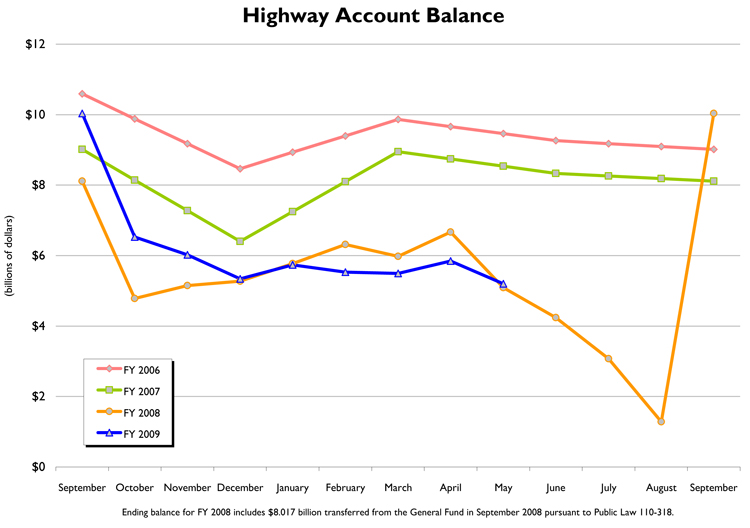Secretary of Transportation Ray LaHood ran into intense political opposition this week from members of Congress over his proposed fix for the Highway Trust Fund, which runs out of money this summer.
LaHood, a politician with more experience dealing with the legislative branches than with transportation issues, was confronted by Minnesota Democrat James Oberstar, who was not happy with LaHood’s proposal that would essentially continue the bankrupt status quo for 18 months beyond the end of this fiscal year on September 30th. LaHood just wants to inject billions in cash to prop up the account and keep the funding to states flowing. This, of course, pushes real policy decisions that are now required into the future. Oberstar wants sweeping changes and will introduce a bill next week.

LaHood's proposal continues the bankrupt status quo with an injection of billions in borrowed cash, and pushes politically unpopular increased taxes or spending cuts into the future.
Both were ultimately taking self-interested positions. Passing transportation legislation in Congress is a complicated process, now made more complicated as we veer toward depression that has seen the revenue raised by fuel taxes for the Highway Trust Fund plummet.
While President Obama continues with high approval ratings, deficit spending and/or tax increases to cover the rising sea of red ink in the federal budget are extremely unpopular. So LaHood, an Obama appointee, played for time by deferring into the future either cutting highway programs or increasing taxes.
“The Administration inherited a difficult problem — a system that can no longer pay for itself. There simply is not enough money in the Highway Trust Fund to do what we need to do,” said LaHood. “The fiscal year 2010 budget frames the challenging spending decisions facing policymakers. Clearly as we approach the reauthorization of surface transportation programs, we will need to think creatively as we search for sustainable funding mechanisms.”
Oberstar countered with his own position and said he would shortly propose legislation that would increase spending on highways and transit by a staggering 50% from the current $286.5 billion. He did not say how such an increase would be funded, but previous ideas he has floated favor his largely rural state by shifting costs to urbanized areas. To get this done before the Trust goes bust, he would have to get a measured passed by the end of September, a prospect that is unlikely, to put it politely, in the fractious Congress.
LaHood admitted that an 18 month deferral was “an unusual step, I know. But, with the Fund likely to run out of money by late August, it’s a little too late to worry about business as usual. Beyond keeping the Highway Trust Fund solvent, an immediate 18-month reauthorization provides Congress the time it needs to fully deliberate the direction of America’s transportation priorities. That’s the kind of thoughtful decision-making America deserves.”
Oberstar as recently as last month advocated a controversial user fee scheme to fund roads. When the Duluth News Tribune, a significant paper in his district, stridently objected, he replied:
“A user fee based on vehicle miles traveled – known as VMT – is one option Congress is considering. It has the advantage of charging motorists for their actual use of roads. It also addresses a current inequity between rural and urban areas. About 15% of the nation’s lane miles of highway are in urban areas, where 50% of traffic flows. Rural motorists pay a 35% premium to pay for urban roads they do not use. A VMT would allow for a lower rate to be paid in less-congested areas where less maintenance is needed. Adjustments could be made for weight, allowing drivers of lighter, more economical vehicles to pay less,” Oberstar said.
As LaHood correctly explained, highways are built, repaired, and maintained with payments from the Highway Trust Fund. The Fund is replenished by revenue collected from motor fuel taxes when you buy fuel. When Fund spending in a given period is more than the fuel tax collected in the same period, the Fund declines. When the decline persists over months or years, the Fund runs out of money, and this limits the ability of the Federal government to help states fix roads. In 2008 Congress had to kick in an extra $8 billion to the Fund. And 2009 will require even more money.
As always the question is who pays, or these days, how do we get someone else to pay? Stay tuned your auto mobility and how much it costs is up for debate.
